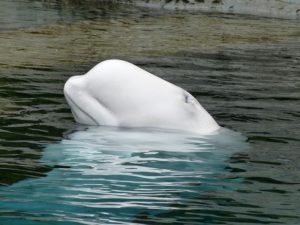Thank you for stopping at Factsking.com for your Beluga Whale facts! Below are 37 interesting facts about Beluga Whales. If you are interested in these animal facts, don’t forget to check out our other animal facts!

Facts about Beluga Whale Diet
- The Beluga Whale uses its echolocate to hunt for food.
- The Beluga Whale is a meat-eater, which means it is a carnivore.
- Beluga Whales are known to be picky eaters.
- The Beluga Whales average diet consists of salmon, eulachon, crabs, shrimp, snails, squid, mussels, sandworms, clams, octopus, cod, and flounder.
- On an average day, the Beluga Whale eats around 50 to 60 pounds, which is 22.7 to 27 kg, of food.
- The Beluga Whale never chews its food, they just swallow it whole.
- Baby Beluga Whales will start eating sea creatures after the get their teeth.
Beluga Whale Size
- The Beluga Whale is among the smallest whales.
- The adult Beluga male’s size can range in length from 13 to 20 feet, which is 4 to 6.1 meters. They can weigh anywhere from 2,000 – 3,000 pounds or 907 to 1,361 kilograms.
- The female Beluga Whale is a bit smaller than the male Beluga.
- Baby Beluga Whales measure at about 4 to 6 feet or 1.2 to 1.8 m in length and weigh around 110 to 130 pounds or 50 to 60 kg.
Facts about Beluga Whale
- The Beluga Whale cannot only reach depths of 800 meters when they dive but their dives can last up to 25 minutes.
- Beluga Whales can swim backwards just as well as they swim forwards.
- While an adult Beluga Whale is white in color, they are actually born dark gray and can take up to eight years to fully change color.
- The Beluga Whale’s neck is so flexible because its vertebrae aren’t fused together.
- Beluga Whales have white skin so they can easily blend into the floating ice within their environment, which makes it hard for predators to see them.
- Beluga Whales can hold their breath underwater for as long as 15 minutes.
- The Beluga Whale is able to echolocate because of a bump on top of their heads, which is called a melon. Other than hunting for food, they also used the echolocate to defend themselves from human predators and find breathing holes in sheets of ice.
- The Beluga Whale does not use their teeth for chewing, instead, they use them for tearing and grasping.
- The Beluga baby Whales do not receive their teeth until they are around 12 to 18 months.
- The female Beluga Whale will mature around four to seven years old, whereas the male matures around seven to nine years old.
Beluga Whale Behaviors
- Beluga Whales are the most vocal whales, so they have been given the nickname “sea canaries.” They are always making some type of noise, whether it is clicking or whistling.
- The Beluga Whales communicate with each other through their sounds.
- Beluga Whales can mimic the sounds they hear, such as a human speaking or other animal sounds.
- Beluga Whales are known to be very social animals.
Beluga Whale Habitat
- The Canadian Waters are home to nearly 150,000 Beluga Whales.
- The Beluga Whale likes to live where it is cold, which is why most are found in the icy waters of the Arctic Ocean.
- Most of the Canadian Beluga Whales live in the Arctic but there are also some who have made their home in the St. Lawrence River.
- About 40% of the Beluga Whale’s body mass is blubber, which helps them stay warm when they live in such cold environments.
- The Beluga Whale can live in water that gets as cold as freezing, which is 32 degrees Fahrenheit or 0 degrees Celsius.
Beluga Whale Threats
- The Beluga Whale threats include climate change, urban and industrial pollution, gas development, and hunting oil.
- The Beluga Whale’s predators are Polar Bears and Killer Whales.
Beluga Whale Family
- A pod is known as a group of Beluga Whales, which can have as many as 100 Beluga Whales.
- The closest species family member to the Beluga Whale is the narwhal.
- The Beluga Whale generally mates when the water is warming up, which is about March or April.
- The gestation period for the Beluga Whale is about 14 to 15 months.
- When the baby Beluga Whales are born, they are called calves.
I hope that these facts about Beluga Whales were helpful to you. If you are interested in facts about other animals, visit animal facts page.
